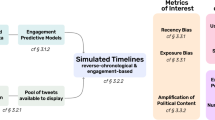Abstract
Various users with diverse spiritual moods and morals react differently to online content. On some users, highly toxic submissions cannot have a noticeable impact, while on another group, even not severely toxic content may provoke them to stop their interactive participation in social media. The same is true toward the intervention of platform holders, in the sense that one punishing moderation may lead a user to respect the community rules to a certain point, while the same action may stimulate the violent and offensive reaction of another user. In that regard, the moderation interventions of the platforms should follow a fine-level nature and be based on user behavior. It should also try to protect the communities the user cares about the most as far as the user, in turn, respects the content policies. The aim of the current study is to classify users into various behavioral groups, which can potentially provide the chance to adopt more efficient moderative measures to protect the community and give the user the feeling that he really deserves the moderative intervention that has experienced. Thus, the behavior of the core users of an already-banned controversial subreddit was taken into consideration, and a machine learning-based classification strategy was imposed on their activity level and their submission toxicity scores. Results have revealed interesting behavioral differences between users of the Reddit social media toward the taken moderations and have indicated the necessity for adopting find-level measures for protecting the platform, as well as the different behavioral groups.
Access this chapter
Tax calculation will be finalised at checkout
Purchases are for personal use only
Similar content being viewed by others
References
Munger, K.: Tweetment effects on the tweeted: experimentally reducing racist harassment. Polit. Behav. 39(3), 629–649 (2017). https://doi.org/10.1007/s11109-016-9373-5
Thomas, P.B., Riehm, D., Glenski, M., Weninger, T.: Behavior change in response to subreddit bans and external events. IEEE Trans. Comput. Social Syst. 8(4), 809–818 (2021)
Miller, B.: “Dude, Where’s Your Face?” self-presentation, self-description, and partner preferences on a social networking application for men who have sex with men: a content analysis. Sex .Cult. 19(4), 637–658 (2015). https://doi.org/10.1007/s12119-015-9283-4
Trujillo, A, Cresci, S.: Make reddit great again: assessing community effects of moderation interventions on r/The_Donald. arXiv:2201.06455 (2022)
Marwick, A.E., Caplan, R.: Drinking male tears: language, the manosphere, and networked harassment. Fem. Media Stud. 18(4), 543–559 (2018)
Davies, L.: Gender, education, extremism and security. Compare 38(5), 611–625 (2008)
Farrell T., Fernandez, M, Novotny, J., Alani, H.: Exploring misogyny across the manosphere in reddit (2019)
Pennacchiotti, M., Popescu, A.M.: A machine learning approach to twitter user classification. In: Proceedings of the International AAAI Conference on Web and Social Media, vol. 5, no. 1, pp. 281–288 (2021)
Guimarães, R.G., Rosa, R.L., De Gaetano, D., et al.: Age Groups Classification in Social Network Using Deep Learning. IEEE Access 5, 10805–10816 (2017)
Tavares, G., Mastelini, S., Jr., S.: User classification on online social networks by post frequency. In: Anais do XIII Simpósio Brasileiro de Sistemas de Informação, Lavras, pp. 464–471 (2017)
Tinati, R., Carr, L., Hall, W., et al.: Identifying communicator roles in twitter. In: Proceedings of the 21st International Conference Companion on World Wide Web, pp. 1161–1168. ACM (2012)
Gothard, K.C.: Exploring Incel Language and Subreddit Activity on Reddit, UVM Honors College Senior Theses 408 (2020) https://scholarworks.uvm.edu/hcoltheses/408
Maxwell, D., Robinson, S.R., Williams, J.R., et al.: “A Short Story of a Lonely Guy”: a qualitative thematic analysis of involuntary celibacy using reddit. Sex .Cult. 24, 1852–1874 (2020)
Baumgartner, J., Zannettou, S., Keegan, B., Squire, M., Blackburn, J.: The pushshift reddit dataset. In: The 14th International AAAI Conference on Web and Social Media (ICWSM 2020), pp. 830–839 (2020)
Chandrasekharan, E., Jhaver, S., Bruckman, A., Gilbert, E.: Quarantined! examining the effects of a community-wide moderation intervention on reddit (2020)
Chandrasekharan E., Pavalanathan U., Srinivasan, A., et al.: You can’t stay here: the efficacy of Reddit’s 2015 ban examined through hate speech. In: Proceedings of ACM Human-Computer Interaction CSCW, vol. 1, Article 31, p. 22 (2017)
Rieder, B., Skop, Y.: The fabrics of machine moderation: Studying the technical, normative, and organizational structure of Perspective API. Big Data & Soc. 8(2) (2021)
Menzie, L.: Stacys, beckys, and chads: the construction of femininity and hegemonic masculinity within incel rhetoric. Psychol. Sexual. 13(1), 69–85 (2020)
Zannettou, S.: “I Won the Election!”: an empirical analysis of soft moderation interventions on twitter. In: The 15th International AAAI Conference on Web and Social Media, pp. 865–876 (2021)
Cresci, S., Trujillo, A., Fagni, T.: Personalized interventions for online moderation. In: The 33rd ACM Conference on Hypertext and Social Media (HT 2022), pp. 248–251. ACM (2022)
Author information
Authors and Affiliations
Corresponding author
Editor information
Editors and Affiliations
Rights and permissions
Copyright information
© 2024 The Author(s), under exclusive license to Springer Nature Switzerland AG
About this paper
Cite this paper
Nasirian, S., Nogara, G., Giordano, S. (2024). Not My Fault: Studying the Necessity of the User Classification & Employment of Fine-Level User-Based Moderation Interventions in Social Networks. In: Cherifi, H., Rocha, L.M., Cherifi, C., Donduran, M. (eds) Complex Networks & Their Applications XII. COMPLEX NETWORKS 2023. Studies in Computational Intelligence, vol 1144. Springer, Cham. https://doi.org/10.1007/978-3-031-53503-1_29
Download citation
DOI: https://doi.org/10.1007/978-3-031-53503-1_29
Published:
Publisher Name: Springer, Cham
Print ISBN: 978-3-031-53502-4
Online ISBN: 978-3-031-53503-1
eBook Packages: EngineeringEngineering (R0)




